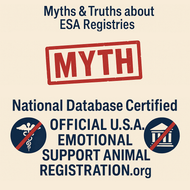ESA Registries: Myths vs Truths (ADA, FHA, Air Travel)
Posted by WorkingServiceDog on Nov 1st 2024
Dozens of websites use official-sounding names like “United States …” or .org domains to imply government authority. It’s easy to assume there’s a national Emotional Support Animal (ESA) registry—there isn’t. Below are the common myths and the real rules so you can make informed decisions.
Myth #1: “There is a national ESA registry.”
Truth: No U.S. federal or state agency maintains a national ESA database. When you “register” with a private site, you’re simply entering information into that company’s internal list. Landlords, hotels, airlines, and stores do not use or recognize a national ESA lookup because none exists.
Myth #2: “ESAs have the same public access rights as service dogs.”
Truth: Under the Americans with Disabilities Act (ADA), ESAs are not service animals and do not have public access rights. ESAs cannot lawfully enter places like restaurants, stores, or hotels solely because they are ESAs.
Myth #3: “Airlines must accept ESAs for free.”
Truth: Since 2021, U.S. Department of Transportation rules allow airlines to treat ESAs as pets. That means standard pet policies and fees apply unless the airline offers an exception. ESAs are no longer recognized as service animals for air travel.
Myth #4: “You must certify or register an ESA.”
Truth: There is no government certification for ESAs. The core requirement is a current letter (prescription) from a licensed mental health professional stating that the animal provides emotional support that alleviates symptoms of a disability. Many housing providers accept letters dated within the past year.
So what rights do ESAs have?
Under the Fair Housing Act (FHA), people with disabilities are entitled to reasonable accommodation to live with an ESA in housing that otherwise restricts pets. Housing providers may request appropriate documentation (your ESA letter) but cannot require a “registration,” training proof, or a specific vest.
What ESA gear is actually useful?
- ID holders, collars, or tags that clearly say “Emotional Support Animal” can help reduce confusion during housing interactions.
- Comfortable vests improve visibility during appointments or moves—but they are not legally required.
- Keep a digital copy of your ESA letter handy for easy sharing with property managers.
Bottom line
Registering with a private site is optional and not a legal requirement. Focus on what matters: a valid ESA letter, a well‑behaved animal, and clear communication with housing providers. If you choose identification gear, make sure the company clearly explains that there is no official government ESA registry.
Need practical, clearly labeled ESA gear? Explore our ESA collection for vests, tags, and ID holders designed for simple, professional presentation.

